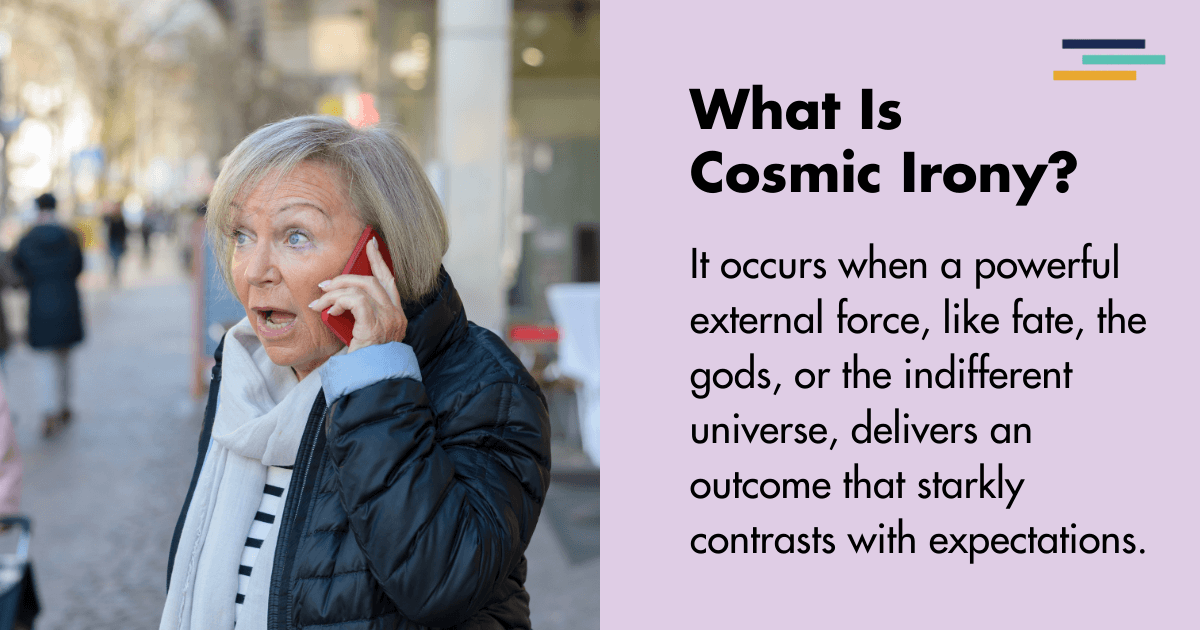
As writers, we’ve all had moments where life throws something unexpected at our characters (and sometimes at us)…
But when the universe itself seems to play tricks?
That’s what we call cosmic irony.
Cosmic irony isn’t just another form of irony, it’s a powerful storytelling tool that adds depth and complexity to your narrative. It’s the universe taking the steering wheel, subverting the hopes, plans, or actions of your characters in ways that feel almost… well, cosmic.
In this article, I’ll break down what cosmic irony is, how it’s used, and—perhaps most importantly—how you can use it effectively in your own writing.
Let’s dive in.
Take a free trial of Fictionary today and take your story to the next level.
What Is Cosmic Irony?
Before we can start weaving cosmic irony into our stories, we need to understand exactly what it is.
The term can sometimes sound lofty, but at its core, cosmic irony plays with fate, chance, or even the divine to mock the expectations of characters. Essentially, it’s the universe—or whatever higher power you choose—having a good laugh at someone’s expense.

Cosmic Irony Definition
So, what exactly is cosmic irony?
At its most basic, cosmic irony occurs when a powerful external force—be it fate, the gods, or the indifferent universe—delivers an outcome that starkly contrasts with what readers and characters expect.
Think of it like this: your character is working toward a goal, only for some unseen hand to undercut their efforts. The result feels orchestrated by a force beyond human control.
Pro tip: Futility and cosmic irony go hand-in-hand. The universe isn’t cruel, per se, just indifferent.
Cosmic Irony Meaning
The meaning of cosmic irony goes beyond just the event itself.
It’s the “why” behind the ironic twist. The universe (or fate) isn’t acting out of malice—it’s not out to punish the character for any particular sin. Instead, the character’s misfortune or failure feels random or even absurd, which can leave the audience questioning the fairness of life or existence itself.
Cosmic irony adds existential weight to your narrative.
It emphasizes the randomness of life and the inability of people to control their fate. It’s a tool that, when used well, gives readers a sense of the larger forces at work within a story.
Cosmic Irony Examples
Now that you’ve got a grip on what cosmic irony is, let’s look at how it’s played out in literature, movies, and even real life.
Sophocles’ Oedipus Rex
Few stories embody cosmic irony quite like Oedipus Rex.
Oedipus is told by an oracle that he will kill his father and marry his mother. Determined to avoid this horrible fate, Oedipus leaves his home, only to set in motion a series of events that lead directly to fulfilling the prophecy.
In trying to avoid his destiny, Oedipus walks straight into it. The universe (or, in this case, the gods) seems to revel in this cruel twist of fate, making Oedipus’ efforts to escape futile.

James Cameron’s Titanic
In the movie Titanic, we witness the ultimate example of cosmic irony.
The ship, which is believed to be “unsinkable,” famously meets its tragic fate after striking an iceberg. The cosmic twist is in how human hubris—represented by the confidence in the ship’s invincibility—collides with the indifferent forces of nature.
Rose and Jack’s love story becomes even more heartbreaking in the face of this grand, uncontrollable disaster.
The universe, indifferent to human emotions and achievements, orchestrates the ship’s demise, leaving the characters powerless in the face of nature’s overwhelming force.
No Country for Old Men
In No Country for Old Men, cosmic irony plays a crucial role in shaping the narrative.
The character Llewelyn Moss stumbles upon a suitcase filled with money from a botched drug deal, believing it’s his lucky break. But instead of finding fortune, he sets off a chain of violence that eventually leads to his untimely death.
The irony here is that the very thing Moss believes will change his life for the better becomes his downfall.
The universe, through the form of chance and circumstance, toys with Moss, reminding both him and the audience that fate is inescapable and indifferent to individual desires.
Stephen King’s The Mist
In Stephen King’s The Mist, cosmic irony delivers one of the most gut-wrenching endings in modern horror.
The protagonist, David Drayton, believes that he can protect his group from the mysterious, deadly creatures lurking in the mist. After a long, tense struggle for survival, David must make a devastating decision, leading him to mercy kill his companions to save them from the horrors outside, only to be rescued moments later.
The universe, indifferent to his suffering, delivers salvation too late, highlighting the cruel, unpredictable nature of fate. The timing of the rescue turns David’s sacrifice into a bitter, ironic twist of fate.
Shakespeare’s King Lear
In King Lear, the title character hopes to retire in peace after dividing his kingdom among his daughters. However, his plan backfires horribly when two of his daughters betray him, leading to Lear’s descent into madness.
Despite his best intentions, the forces beyond his control—mainly his daughters’ treachery—lead him to ruin.
The bitter irony?
Lear’s downfall was driven by the very decisions he thought would secure his future.
H. G. Wells’ The War of the Worlds
Cosmic irony also finds a place in sci-fi.
In The War of the Worlds, humanity is powerless against the superior Martian invaders—until the smallest, most insignificant force takes them down: bacteria.
This twist is an example of the universe’s indifference to both the Martians and the humans. The invaders, unstoppable by human hands, get wiped out by a natural force they couldn’t have foreseen.
Cosmic Irony vs Other Irony
By now, you might wonder how cosmic irony differs from other types of irony. It’s easy to confuse them, but let’s break down the key differences:
- Verbal Irony: This occurs when someone says the opposite of what they mean. It’s typically used to convey sarcasm or humor. For example, if it’s pouring rain and someone says, “Lovely weather we’re having,” that’s verbal irony.
- Situational Irony: In this form, the opposite of what characters and readers expect happens, often in a mundane setting. For example, a fire station burning down is situational irony. It’s unexpected and ironic, but not necessarily because of any larger cosmic force.
- Dramatic Irony: This is when the audience knows something that the characters don’t. It often creates tension or humor because the reader or viewer is in on a secret. For example, in Romeo and Juliet, we know Juliet is alive when Romeo believes she is dead.
Cosmic irony is about the larger, unseen forces that affect our lives—fate, chance, or the universe itself.
It often highlights the smallness of human beings in the grand scheme of things, reminding us that the universe isn’t always concerned with our plans.

Tips for Writing Cosmic Irony
Now that we’ve covered what cosmic irony is and how it’s different from other types of irony, let’s get into how you can use it in your own writing.
1. Use Cosmic Irony to Emphasize Theme
Cosmic irony is great for stories that focus on existential themes like fate, destiny, or the randomness of life. Think about what larger ideas you want to explore in your story and let cosmic irony be the tool that drives them home.
2. Create a Sense of Powerlessness
One hallmark of cosmic irony is the sense that your character is powerless in the face of larger forces. To achieve this, put your protagonist in situations where they believe they have control, only to have that belief shattered by the indifference of the universe. Make the resolution seem inevitable, but in a way that defies their expectations.
3. Build Up Expectations Then Subvert Them
For cosmic irony to have its full effect, it’s important to build up your character’s expectations or the audience’s assumptions. Let them think they know where the story is going, only to pull the rug out from under them. The more the character (and the reader) invests in a particular outcome, the stronger the impact of the irony.
4. Keep It Meaningful, Not Cruel
While cosmic irony can feel harsh, it’s not about punishing your characters for no reason. There’s a deeper meaning to the twist—whether it’s an existential comment on fate or a critique of human arrogance. Make sure the irony serves a purpose in your story rather than just existing for shock value.
5. Leave Room for Reflection
After the ironic twist, give your characters (and readers) space to reflect. Cosmic irony often leaves people questioning their place in the universe or the fairness of life itself. Use that moment to add emotional depth to your story, showing how the character copes with the randomness of fate.
Cosmic irony is a powerful tool when used well.
By understanding its nuances and learning how to apply it, you can create stories that resonate on a deeper level with your readers, making them question not just your characters’ fate, but their own.
And finally, always remember that the story comes first. Focus on:
- Creating engaging characters
- Penning interesting plots
- Structuring solid settings
A tool like Fictionary helps you turn your draft into an interesting story readers love. So, with a strong narrative foundation, your writing can truly shine.



